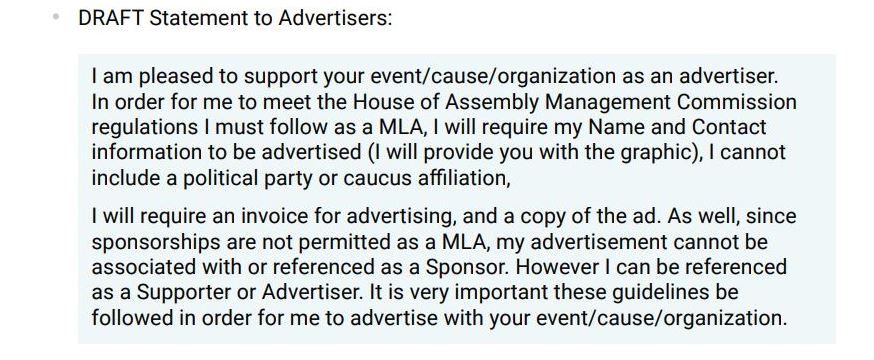Nova Scotia MLAs spent more than $175,000 of taxpayers’ money on advertising between April and September of this year, according to an analysis of expense reports posted by the province’s legislature.

In that period, advertisements appeared in a wide range of forms, such as traditional media like newspapers and radio as well as sports and entertainment program booklets, hockey rink banners and high school yearbooks, among many others.
The charges run from just a few dollars, such as a $4.38 Facebook ad by Liberal MLA Lena Diab, into the thousands, such as Liberal MLA Iain Rankin’s $2,363.46 expense for water bottles.
It’s a practice the Canadian Taxpayer Federation (CTF) says doesn’t provide residents with “a lot of value,” all while helping to bolster incumbent MLAs’ chances in future elections.
“It essentially helps ensure their incumbent advantage in the next election by making sure their face is everywhere,” explained the CTF’s Atlantic director Paige MacPherson.
READ MORE: Nova Scotia municipalities to have uniform expense reporting under bill
While the rules of the Legislative Assembly prohibit MLAs from donating public funds, advertising instead is encouraged as a way to support community groups and organizations monetarily within the existing regulations.
The Canadian Taxpayers Federation disagrees with MLAs billing taxpayers for advertising and promotion. Atlantic Director Paige MacPherson said these items should raise a red flag. "There's not a lot of value that taxpayers get from MLAs advertising all over the place." pic.twitter.com/8VEM0sGk79
— Jeremy Keefe (@Jeremy_Keefe) December 6, 2018
But advertising as a blanket expense category doesn’t discriminate between small groups in need of funding and large-scale, for-profit businesses.

Get breaking National news
“They’re going to be putting advertisements wherever they think they can get the most bang for their buck, wherever they can earn the most votes through those advertisements,” said MacPherson.
The catch, if there is one, is that MLAs must provide their contact information on any expensed advertisement.
Still, that means instead of simply handing out funds anonymously, the elected official could receive the added bonus of increased familiarity in their riding.
But the way the rules distinguish between advertising and sponsorship is where MacPherson really takes issue.
“The strange thing is it’s explicitly written in the act as a workaround for MLAs wanting to give cheques to whatever it may be in their community,” she said.
Government MLA and Member of the House of Assembly Committee Labi Kousoulis said advertising is a way to help ensure constituents can contact their elected representatives with any questions or concerns they may have.
“You’re communicating how people can get in contact with you,” Kousoulis explained. “So that’s where the line is drawn.”
“If a sports team is asking for sponsorship that would not meet the rules, but if the same team perhaps built a banner and said: ‘We have spots on it,’ you can’t just put your picture on there. It has to have contact information,” he said.
“The key is that when people see the advertisement, there has to be contact information.”
WATCH: Stephen McNeil tops list of premiers racking up international travel

But MacPherson argues that since it’s public money, such decisions should be made in public rather than left up to MLAs to dole out as they see fit.
“If something in a community deserves money, requires taxpayer dollars, let’s make that decision out in the open,” she said. “Let’s not do it through this strange workaround where the MLA has to buy an ad wherever might be politically advantageous to him or her.”
“It definitely leaves room for that political interference,” she said.










Comments
Want to discuss? Please read our Commenting Policy first.